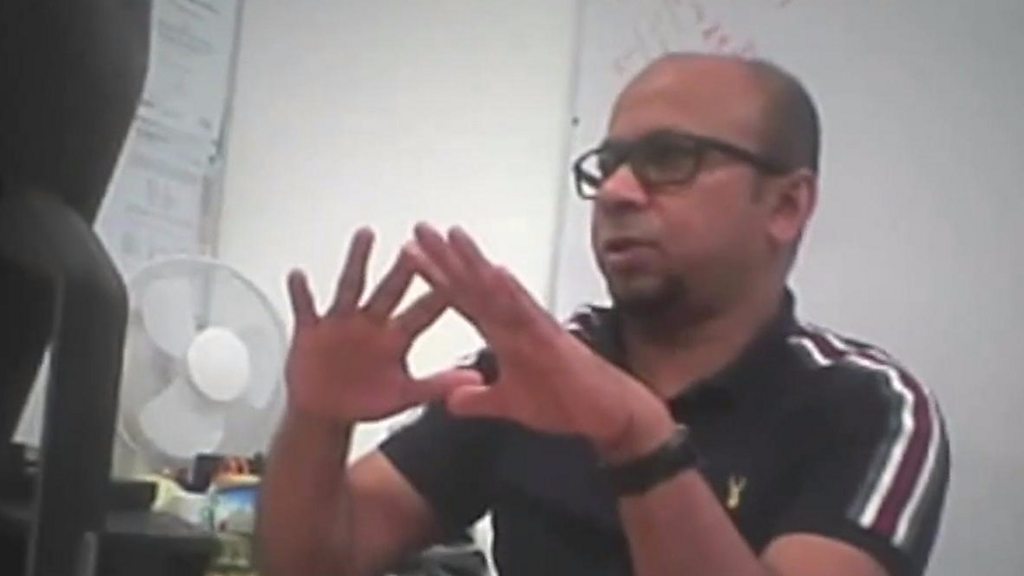UK Citizenship Tests: Gangs Help Cheating Candidates Pass


Media playback is unsupported on your device
Gangs are helping foreign nationals cheat their UK citizenship application test with the use of earpieces, a BBC investigation has revealed.
For a fee of up to £2,000, criminals secretly listen in and, via a hidden earpiece, give the answers to those taking the Life in the UK test.
Such an operation was secretly filmed by a BBC journalist, who was given help to pass.
The test is failed by about one in five would-be British citizens.
The Home Office said it took any cheating "extremely seriously".
A pass in the test, which assesses candidates' knowledge of UK laws, history and society, is usually required as part of the process to secure UK citizenship or indefinite leave to remain.
The number of applications for citizenship made by EU nationals rose by 32% last year and the BBC heard some were paying criminals to cheat the Life in the UK test, as anxiety grows over citizenship rights post-Brexit.
One woman, an EU national, told the BBC she decided to cheat after failing first time around, saying she "felt so much panic" about her situation.
Over the past year, nearly 150,000 people have sat the test, which consists of 24 multiple-choice questions.
The test, which is taken on a computer and has a pass mark of at least 18 correct answers, is supposed to be held under strict exam conditions.
Administration of the tests is outsourced by the government. There are 36 testing centres in the UK.
BBC researchers were able to access organised cheating when they went undercover at training academies in and around London, where candidates take classes to prepare for the test.
Masoud Abul Raza runs the Ideal Learning Academy in east London.
He was filmed telling an undercover researcher that he could guarantee a pass.
"You have to spend nearly £2,000. This is the business, it's completely hidden. But you are getting a result," he said.
Mr Abul Raza and his gang later provided the undercover researcher with a hidden two-way earpiece, linked wirelessly through a Bluetooth connection to a concealed mobile phone with an open line. This meant the gang outside could hear the audio feed of the test questions and provide the answers.
"Everything will be arranged. He will give you the answer," Mr Abul Raza told the undercover journalist.
Tony Smith, the former director general of the UK Border Force, was shown the secretly recorded footage and described it as "clear and blatant cheating by an organised crime gang".
"One would hope that the standards will change significantly so that the public can be assured that people going through this process are genuinely entitled to stay in this country," he said.
The Home Office said test centres were required to put in place stringent measures to prevent cheating, including searches of candidates to ensure no electronic devices enter the test room.
"Unannounced visits" are also carried out to audit these processes.
But the BBC's undercover researcher was not searched or told to hand over all electronic devices.
He sat the test, giving the answers provided to him, and within minutes of it ending he had received the pass certificate required to apply for citizenship and a UK passport.
Despite being caught on camera, Mr Abul Raza denied cheating, maintaining he only organises legitimate training.
However, he is not the only one profiting from cheating the system.
The BBC heard reports of other training academies doing the same thing, with the same method of cheating having been used at testing centres around the UK.
At the English Language Training Academy (ELTA) in east London, Ashraf Rahman told the BBC's undercover researcher that he had arranged cheating in Birmingham and Manchester, as well as London.
"I've been here for five years and no-one gets caught," he said.
Mr Rahman later denied he arranged cheating, claiming he was just discussing what others did.
ELTA denied cheating took place on its premises and said Mr Rahman was not an employee.
From Chip War To Cloud War: The Next Frontier In Global Tech Competition
The global chip war, characterized by intense competition among nations and corporations for supremacy in semiconductor ... Read more
The High Stakes Of Tech Regulation: Security Risks And Market Dynamics
The influence of tech giants in the global economy continues to grow, raising crucial questions about how to balance sec... Read more
The Tyranny Of Instagram Interiors: Why It's Time To Break Free From Algorithm-Driven Aesthetics
Instagram has become a dominant force in shaping interior design trends, offering a seemingly endless stream of inspirat... Read more
The Data Crunch In AI: Strategies For Sustainability
Exploring solutions to the imminent exhaustion of internet data for AI training.As the artificial intelligence (AI) indu... Read more
Google Abandons Four-Year Effort To Remove Cookies From Chrome Browser
After four years of dedicated effort, Google has decided to abandon its plan to remove third-party cookies from its Chro... Read more
LinkedIn Embraces AI And Gamification To Drive User Engagement And Revenue
In an effort to tackle slowing revenue growth and enhance user engagement, LinkedIn is turning to artificial intelligenc... Read more

